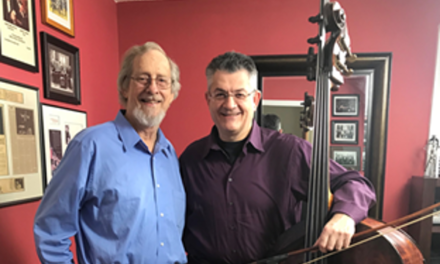The Eastern Music Festival concluded with a performance by their Eastern Festival Orchestra, under the direction of Gerard Schwarz. The grand finale, held in Guilford College’s Dana Auditorium, was packed with drama and excitement from beginning to end, featuring works by Ellen Taaffe Zwilich, Tchaikovsky, and Richard Strauss. The program started with Zwilich’s “Avanti: Fanfare for Jerry,” which was a perfect prelude for the rest of the evening. It was a short but powerful piece, waking the audience up with its grand, expansive lines and textures.
The fanfare continued as we got into the meat of the program: Tchaikovsky’s Piano Concerto No. 1 in B-flat, featuring pianist Marika Bournaki. There were times in this piece that the concert hall swallowed up some of Bournaki’s articulation, especially in sections with fast repeated notes, but she and the orchestra still provided a thoroughly enjoyable interpretation. They nailed all my favorite parts of the first movement, like the pizzicato and staccato sections and the sweet second theme which corresponds with cascading, water-like arpeggios in the piano part. Bournaki also pulled off the big cadenza wonderfully, which is almost an entire piece in itself. The second movement actually suited the Steinway concert grand perfectly, making great use of its ringing high register. I loved watching Bournaki’s technique at work, showcasing her delicate touch while still managing to stay dynamic and versatile. Then, of course, came the stormy third movement, which always feels like it goes by too fast. This is where the orchestra got to showcase their versatility, taking the opportunity to seamlessly transition between Tchaikovsky’s frantic and tender themes. This concerto is one of those pieces that is performed somewhere every night of the week, and that familiarity makes it easy to be very critical of the performance. But, I find it is more important that the performers provide an engaging and loving interpretation, and that is exactly what Bournaki and the Eastern Festival Orchestra did with the Tchaikovsky concerto.
The last piece of the program was Schwarz’s edition of Richard Strauss’ Suite from Der Rosenkavalier. As the suite pulls music from the Strauss opera of the same name, it was a joy to see how the orchestra portrayed all the emotions and drama of an opera without being able to use sets, costumes, words, etc. It is always important for musicians to test their storytelling abilities in a situation like this, and Schwarz and the orchestra rose to the challenge. From the very beginning, I was drawn in by certain harmonies and syncopations that would throw off the beauty of the music momentarily, and the way the orchestra executed these moments always kept me on my toes in the best way. As I said earlier, a work like this challenges musicians to become storytellers, and this is most important as the piece comes to a close with utterly breathtaking swells and the thunderous reprise, where the orchestra has to play up the emotion of the moment even more than a singer would with the tools they are given. Even if you knew nothing about the opera, you could imagine the events unfolding before you because of how vividly they were portrayed by the orchestra.
With this finale, the Eastern Music Festival capped off several weeks of memorable performances and absolutely daunting programs for the musicians. I cannot wait to see what they have in store for next year, and I encourage anyone who missed out to attend all the performances they can in 2023.











